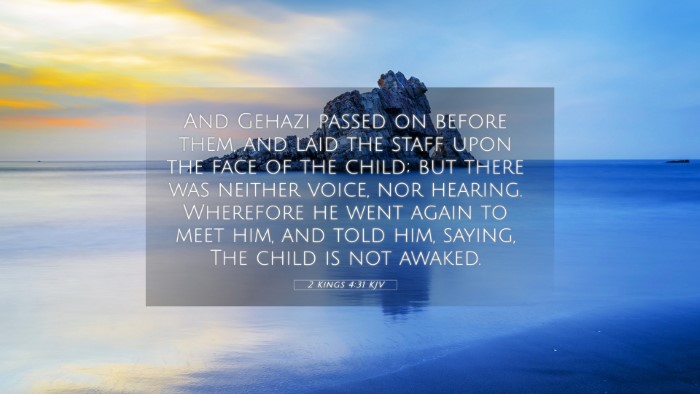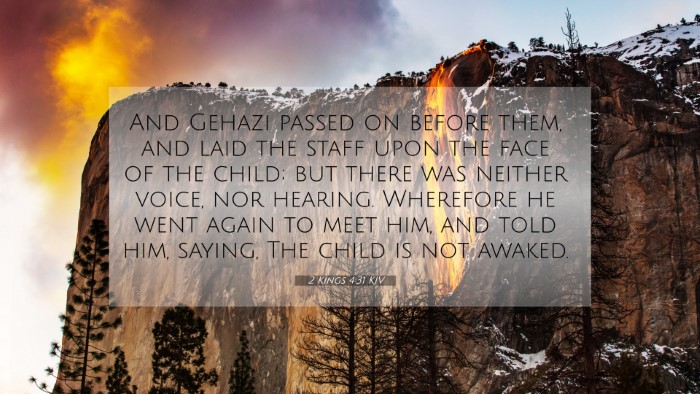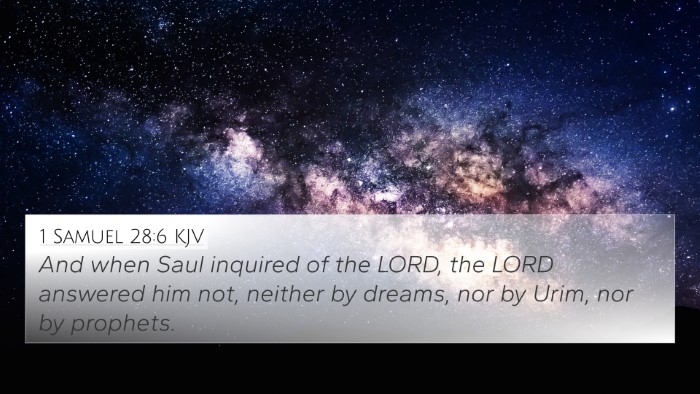Understanding 2 Kings 4:31
Verse: 2 Kings 4:31
Summary: This verse presents a poignant moment within the narrative of Elisha’s ministry, depicting both the urgency of the situation and the profound realities of faith in action. Elisha sends Gehazi ahead with the staff, symbolizing his authority, but the passage opens up a discussion on living faith, intercession, and the communication between the divine and human realms.
Verse Analysis
Contextual Overview: The chapter highlights Elisha's role as a prophet and miracle worker during a time of crisis. The previous verses set the stage where a Shunammite woman seeks assistance after her son’s tragic death. Elisha's quick response reflects the urgency of her need.
Key Themes and Insights
-
Faith in Action:
- This verse emphasizes the importance of taking action in faith. Gehazi's journey signifies a physical demonstration of the spiritual authority that Elisha represents.
- Elisha instructs Gehazi to act quickly, underscoring the urgency often present in matters of faith.
-
Authority and Role of the Prophet:
- Elisha’s instructions to Gehazi illustrate the transmission of prophetic authority.
- The staff represents not only physical action but also the power of God being channeled through the prophet’s servant.
-
Divine Intercession:
- The action taken by Gehazi is a form of intercession, seeking to bridge the gap between the woman’s despair and God’s power.
- It reflects a teamwork dynamic between the prophet and his disciple, lending to the communal aspects of faith.
Cross References
When examining 2 Kings 4:31, several biblical texts provide additional layers of meaning. The following verses can be considered for a comparative Bible verse analysis:
- 1 Kings 17:17-24: The account of Elijah raising the widow's son parallels Elisha's actions and emphasizes the prophetic ministry's role in healing.
- Luke 7:11-17: Jesus raises the widow's son at Nain, connecting prophetic miracles to New Testament ministry.
- Mark 5:35-43: The raising of Jairus’s daughter showcases similar themes of faith and divine authority, reinforcing the significance of prophetic intercession.
- John 11:21-43: The resurrection of Lazarus illustrates Jesus' authority over death, serving as a culmination of prophetic fulfillment.
- Romans 8:28: This verse reminds us that God works for the good of those who love him, reinforcing the brightness of faith in times of distress.
- James 5:16-18: The prayer of a righteous person is powerful and effective, reflecting the central fundraising theme of prayer and faith.
- Hebrews 11:32-34: Celebrating the faith of the prophets, this text encourages believers to reflect on the impact of their faith in action.
- 2 Timothy 1:6-7: The gifting and calling of believers highlight the importance of using given spiritual authority for God’s purposes.
Thematic Connections and Cross-Referencing
Linking Bible scriptures such as these encourages deep understanding, and the act of cross-referencing Biblical texts can enhance personal study and communal teaching alike. The connections between these verses offer a profound view into God's continuing relational dynamics with humanity through different covenants.
The themes encountered in 2 Kings 4:31 reverberate with both the Old and New Testaments, showcasing a continuum of God’s interaction through designated leaders and their followers.
Additional Reflections
Understanding how to find cross-references in the Bible enhances our perception of scriptural narratives. Tools such as a Bible concordance and various cross-reference guides can assist any believer in exploring the depth of scripture.
Engaging in a cross-reference Bible study can unveil links between the Prophets and Apostolic teachings, giving more profound insights into the inter-Biblical dialogue. These reflections can be influential for sermon preparation or personal edification, enriching the individual’s commitment to God's word.
Conclusion
In conclusion, 2 Kings 4:31 serves as a powerful testament to faith and Divine intervention during crisis. By employing cross-referenced themes and analyzing related scriptures, we cultivate a more comprehensive understanding of God's providence and the importance of human faith in the unfolding story of redemption.
















